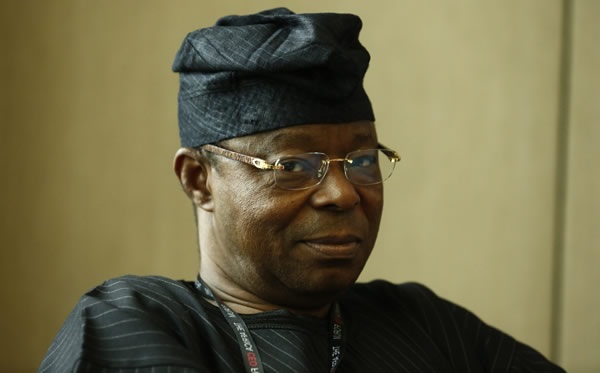How fiscal, monetary policies will stimulate Nigeria’s economy post-COVID-19-Tinubu

All Progressives Congress (APC) National Leader, Asiwaju Bola Ahmed Tinubu, has said the economic pain suffered by the private sector can be counterbalanced by government fiscal and monetary policies that will stimulate the flagging economy.

This is even as he charged the Central Bank of Nigeria (CBN) to lower interest rates to single digits, as this may spur some private sector and will lower the charge on government deficit spending.
READ ALSO: TUC calls for proper coordination, distribution of palliatives
He made this disclosure in a well-reasoned position on the economic stimulus programme and revamping the economy at this challenging time, which was obtained by The Daily Times on Wednesday in Lagos.
Tinubu said that no one dares not underestimate the twin dangers posed by the virus itself and the economic consequences of the public health response. However, he noted that the goal must be that the people live neither with disease nor in hunger, adding that the current situation presents a historic chance to establish a more beneficial social contract between government and the governed.
According to him, if we so utilise this moment, it will be recorded as a pivotal one in our national history. If we allow this moment to slip, history will not be obliged to treat us with great mercy.
Commenting on the nation’s economic situation, he said:”” “To stop the viral spread, the world has gone into self-induced economic contraction. Most recessions have their roots in a crisis born first in the financial sector. We should sound an even louder alarm when contraction befalls the financial sector and real economy at the same time. When both experience a steep downturn simultaneously, there exists the true danger of descending into something worse than recession”.
The APC national leader added that the global economy has turned against us, while oil prices have steeply fallen. Though, the price may rebound but not nearly enough to return to customary levels.
“The resultant revenue loss impairs the naira exchange rate. In general, the price of imports per unit has become dearer. Thus, the wise policy suggests limiting our imports during this emergency in order to save hard currency and protect the exchange rate”, he said.
Tinubu explained that all the three broad sub-sectors of Nigeria’s private-sector economy, including Agriculture, Service and Industry have all been affected by the COVID-19 crisis, although with different degrees of severity and, in some instances, in entirely different ways.
“Most Nigerians are engaged in low-level agricultural production in rural areas. Thus far, the coronavirus is mostly in urban areas and not in rural communities. Because of their relative isolation and the nature of their work, most farmers can continue their vocation. This means the supply of domestically produced food staples should not materially fall. With the reduction in imports, demand for their crops should accordingly rise.
“Unfortunately, that increased demand cannot translate into actual sales because of the drop in aggregate income suffered by the urban population. This loss of demand, coupled with restrictions on movement and on public marketplace hours, creates great uncertainty for farmers. The uncertainty means farmers and consumers cannot engage in adequate and rational price discovery.
“The cost of the same item may vary significantly from one location to another. Additionally, farmers engaged in non-food crop production will suffer much greater uncertainty as well as greater lost demand for their products than those who cultivate staple foods.
“The farmer is burdened with too much uncertainty for any good to come of it. The government can do a lot to diminish the uncertainty by assuring farmers a minimum price for select staples. This can be done through the reestablishment of commodity boards. See Recommendation 3 below for more detail.
“The urban workforce is mostly engaged in the service sector with a minority of workers involved in industrial manufacturing. Much of the urban labour force has been made idle. The hiring of services such as hair care, taxi driving, artisanal crafts, tailoring, etc., will be substantially deferred at this moment. These people work in businesses that are mostly small and medium-sized. The firms do not have ample cash reserves nor can they borrow funds given the high-interest rates.
“Unemployment has quickly skyrocketed to levels only witnessed in economic depressions. Many families have no money at all. Other families have very little money, perhaps enough to last a few more days. Yet, real life is not some abstract economics book where a person can immediately adjust his demand for goods strictly correspond with his supply of money. Despite the paucity of money, demand for life’s essentials cannot fall below the minimum required to survive. The money-less family still needs food, water, shelter and, to a lesser degree, utilities. In a compassionate society, they should not be made to do without.
“Most families need relief. If relief is not forthcoming, these families risk hunger and its attendant suffering and woes”, he explained.
On the current situation of businesses in Nigeria, he said: “Most businesses are small, service-sector oriented ones that have been roughly battered by the crisis. Without relief, many of these small businesses will permanently close even when things begin their return to normal”.
He, also, pointed out that the financial sector has suffered, just even as foreign investment has shrunk as has domestic borrowing.
“In fact, large businesses also struggle because aggregate demand for their products and services has fallen. “Yet, help to banks and large business is relatively simple. Such aid can be rapidly provided by the CBN. The CBN can lend large amounts of virtually non-interest loans to these firms with the proviso that the companies maintain their existing payrolls.”
“If we must hold to the restrictive public health measures, the people will need economic relief. Activating Trader-Moni and other programs will help many small-scale traders but not the average wage earner who just lost his job. Resort to the strategic grain reserves will blunt hunger but the finite reserve cannot cover all who are in danger.
“If we do not take additional steps to stimulate the economy and answer the demand for food, we risk a deep economic contraction that will prove difficult to cure. The worst of this dark potential can be avoided if the government is prepared to act in ways that not only feed people but protects the basic contours of our private-sector economy so that it can more quickly revive once normal conditions return,” the former Lagos State governor counselled.
On policy recommendation, Tinubu said: “Recessionary forces outweigh inflationary ones at this time. The agricultural sector mostly intact but hurt in part. The service and manufacturing sectors have been weakened and urban employment severely battered. The economy will suffer palpable contraction unless the government enacts countervailing measures.”
Meanwhile, in order to ensure the health of commercial banks, Tinubu said the CBN should give liberal access to its discount window at a virtual zero interest rate policy to assist large businesses to maintain operations and their payrolls.
“The CBN can give conditional interest-free loans. Conditions could include firms maintaining their workforce and even hiring an extra 10 per cent for 2-3 months but at a more reduced wage. These additional workers should be youth hired under a temporary internship or training program”, he said.








